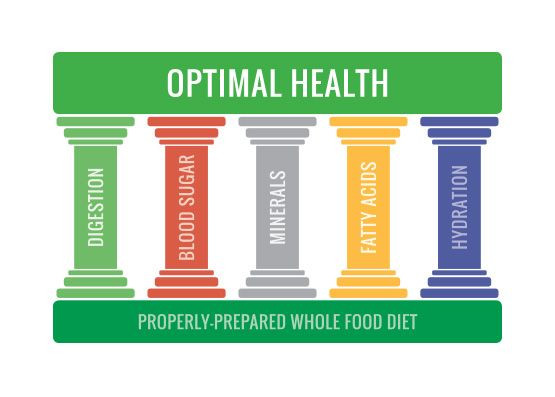Navigating the world of nutrition is no easy task. The information is constantly changing and the answers that we get depend upon who we ask. Some experts recommend diets that are higher in carbohydrates while others tout the benefits of eating mostly fats or proteins. For years we were told to limit our intake of eggs due to concerns with cholesterol and then in 2016 the FDA adopted the advice of an expert panel that decided dietary cholesterol is no longer a “nutrient of concern”. If the Mediterranean diet does not suit you then you can always try eating according to your blood type. It is no wonder why people are so confused!
The issue with these types of dietary recommendations is that they encourage the restriction or even the elimination of certain types of nutrients, whether they be carbohydrates, fats, proteins, or others. Over time, this will lead to imbalances in the body that will eventually result in ill health. For example, a diet high in fats might promote weight loss and mental clarity but if more Omega-6 fatty acids are consumed than Omega-3 fatty acids then this imbalance can result in inflammation and other related conditions. Another problem is that very few diets tolerate modifications to their protocols to account for our bioindividual differences. Unfortunately, this “one-size-fits-all” approach does not work well for everyone and as a result, it is not uncommon for a diet to be an overwhelming success for some people and an epic failure for others.
How is Nutritional Therapy Different?
Nutritional therapy is founded in the belief that poor nutritional choices and the highly processed foods in our modern, standard diet ultimately result in physiological weaknesses in the body. It utilizes a foundational, holistic approach that focuses on the importance of properly prepared, nutrient‑dense whole foods, lifestyle, and quality supplementation as a means of nourishing the body to enhance healing and restore optimal health and wellness. Nutritional therapy acknowledges that we are unique individuals with specific nutritional requirements. It respects the body’s innate intelligence to tell us where it needs nutritional support.

Optimal health depends on achieving a balance between the 6 foundations. Much like a building, the 5 pillars of digestion, blood sugar, fatty acids, minerals, and hydration rest on a solid foundation of a properly prepared, nutrient-dense diet. When we fuel our bodies with the right nutrients, the pillars are balanced and the structure is strong. However, consuming a diet that consists mainly of highly processed foods and hydrogenated oils will weaken the foundation, which has a negative impact on the structure above it. A weakness in one pillar can put stress on the others, eventually causing the entire structure to crumble.
As a Functional Nutritional Therapy Practitioner, I do not diagnose or treat disease. Rather, I am trained to thoroughly investigate this structure to ensure that the foundations are properly supported. This is accomplished using various tools, such as a comprehensive health history interview, a robust nutritional assessment to analyze symptoms burden, and a detailed food/mood journal analysis. Combining this foundational knowledge with advanced training in functional nutrition and laboratory test interpretation provides a powerful clinical skill set that is used to identify blocking factors and imbalances in the body that prevent healing. Addressing these root causes rather than just simply masking the symptoms reduces the chance that the same problems will reoccur, allowing the foundations to naturally rebalance so that vibrant health is restored.
A Few Final Thoughts
Our body strives to feel well. It possesses the ability to not only maintain our health but also to restore it when it is lost. We may not be able to change our genetics, but we can choose how we live our lives and how we eat. The food that we consume provides us with important nutrients. Proper nutrition will fuel our bodies so that we can live happy, healthy, productive lives. Improper nutrition inevitably promotes imbalances and weaknesses in the structure, which can lead to illnesses and disease. My role Functional Nutrition Practitioner goes far beyond just merely telling someone what is good or bad to eat. Rather, I educate people to understand the consequences of their nutritional choices and lifestyle and empower them with personalized knowledge and realistic plans to make better decisions regarding their diet and health. And, as with most things in life, finding the right balance is key.




